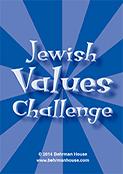- Home
- Play & Learn Home
- Online Enrichment
- Experience Modern Israel
- Israel It's Complicated
- Jewish and Me
- Jewish Holidays Jewish Values
- Jewish Values in Genesis and Jewish Values in Exodus
- Min Ha’aretz
- Our Place in the Universe
- Simply Seder
- The Prophets: Speaking Out for Justice
- Making T'filah Meaningful
- Make, Create, Celebrate
- Yom Haatzmaut Resources
- Hebrew Apps
- About The OLC
- What is the OLC?
- Introduction
- Get Started
- Resources
- OLC Content
- Parent Materials
- See My OLC Classes
- Store
Blogging Jewish Values
Written by Behrman House Staff, 26 of August, 2014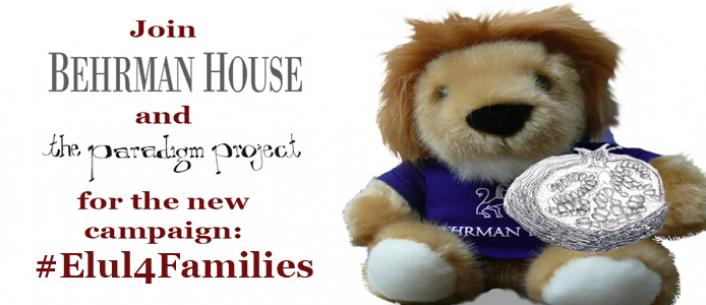
Our friends at the Paradigm Project recruited 29 educators to share a tip for families each day of the month, using 29 values from the new Jewish Values Challenge playing cards as prompts.
Each micro-blogger is writing a 2-3 sentence tip for families, demonstrating one way to realize the day's Jewish value. You can find them throughout the month below.
'Perseverance' ElulFamilyValues blog, by Lyndall MIller:
We think of Elul as a time to review the past year. Often, we focus on our errors and faults, and wonder why we haven’t “corrected” them in the last year. I would like to offer Elul as a time to reflect on the work in which we continue to persevere, year AFTER year.
What is moving forward? How do we want to take advantage of that energy?
Pirkei Avot encourages this attitude: “It is not your responsibility to complete the work, but neither are you free to desist from it." We see young children persevere every day in order to continue constructing their own ideas; let us make sure that we give them, and ourselves, the time this year to do so. Keep up the good work!
'Returning' ElulFamilyValues blog, byJeanne Lovy:
Saying "I'm sorry" is just one part of developing empathy towards others. Educators and families create caring environments and nurture conscience through warmth and guidance.
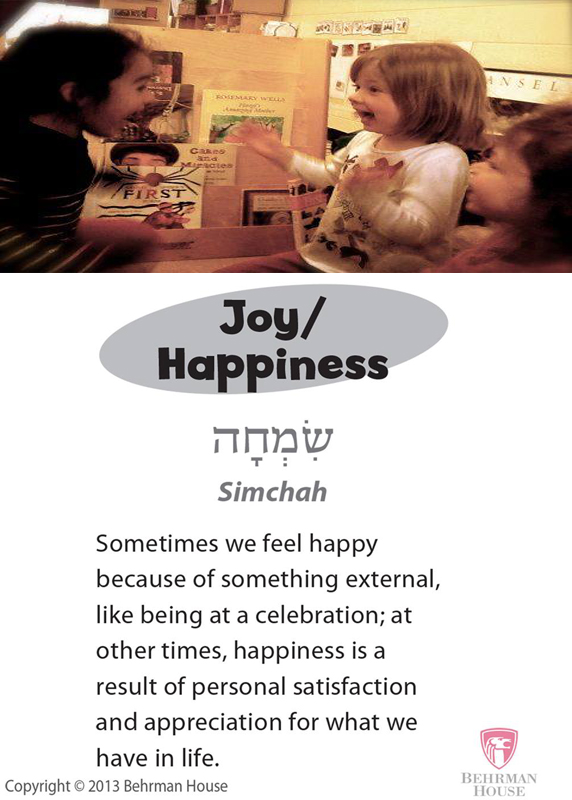 More tips for educators here.
More tips for educators here.
More tips for families here.
'Simchah' ElulFamilyValues blog, by Anna Hartman:
"Study after study confirms that the number on predictor of life satisfaction comes from spending time with people you care about and who also care about you."
Let's persevere in realizing a deep feeling of contentment this year. Tell us how will you begin this holiday weekend?
'Truth' Elul Family Values blog, by Diana Ganger.

God is in Emat. Utopia can be brought forth when all live according to this value. The more our actions and speech meet together, the more trustworthy we are, and the better the relationships we build. In the Hebrew alphabet, Emet encompasses the first, middle, and last letters--the concept is ALL inclusive.
 'Giving' Elul Family Values Blog, by Natalie Drucker Boscoe.
'Giving' Elul Family Values Blog, by Natalie Drucker Boscoe.
Lemonade stands are a great activity for children. Not only will they be practicing and using their math, science, literacy, and social skills, but you can also teach your child about Tzedakah. Have your children choose a cause that is important to them (animals, nature, water, etc.) and they donate their proceeds to the cause.
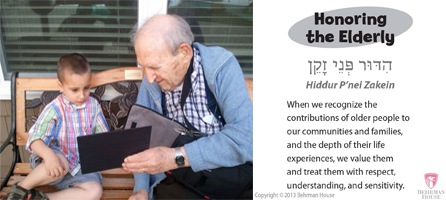 'Honoring the Elderly' Elul Family Values blog, by Jkidphilly parent, Brandi Lerner.
'Honoring the Elderly' Elul Family Values blog, by Jkidphilly parent, Brandi Lerner.
"I began bringing my son to Abramson Center for Jewish Life when he was about 4 months old through a jkidphilly program that was held there. His face lit up when entering the sun-filled atrium to see the residents being serenaded by the cantor... One of my grandmothers currently lives out in Arizona and we do not get to see her nearly as much as we would like. By visiting Abramson, I feel in some way, we are visiting her."
 'Kindness' Elul Family Values blog, by Lisa Plotkin
'Kindness' Elul Family Values blog, by Lisa Plotkin
Kindness is a state of mind, not an occasional action. How do we raise children who are kind? Show them and five them time. Share what we have, welcome others, say nice things... It really can be that simple.
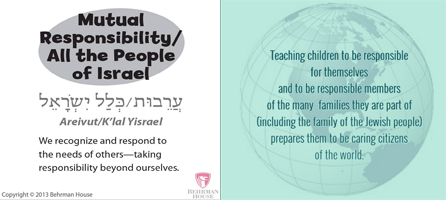 'Mutual Responsibility/All the People of Israel' Elul Family Values blog, by Deb Distler.
'Mutual Responsibility/All the People of Israel' Elul Family Values blog, by Deb Distler.
Community is one of the central values of Judaism. Our texts reminds us that we are responsible to and for one another - that we must not stand idly by when one is in danger, but rather must do what we can to help one another (Leviticus 19:16)
'Family Harmony' Elul Family Values blog, by Karee Pass Bilsky.
The traditional Jewish marriage is characterized by peace, nurturing, respect, and loving kindness. In an early childhood classroom, a "marriage" of sorts exists between the student and the teacher, and among the children in the classroom. A relationship built upon nurturing, trusting and loving each other allows both teacher and students to grow and bond together, thus creating peace in the classroom.

'Hospitality' Elul Family Values blog, by Chana Oz.
There are many natural opportunities to encourage the mitzcah of welcoming guests, and playdates are a perfect one! When two of the children's friends came over recently, we let them pick the seats they wanted and receive their playdough first.
'Attentiveness/Being a Good Listener' Elul Family Values blog, by Amy Bolotin.
Reading with children is one way to model active, mindful listening. Listen to the rhythm of the words on the page; listen to the child's questions and comments. Listen to the deep silence that happens when two hearts are open, focussed on a shared moment of connection and giving.
 'Friendship/Cleaving to Friends' Elul Family Values blog, by Jenna Kalkman-Turner
'Friendship/Cleaving to Friends' Elul Family Values blog, by Jenna Kalkman-Turner
We have the amazing opportunity to both coach and model how to be a good friend everyday: the way we speak to others, listen to others, and connect through various media.
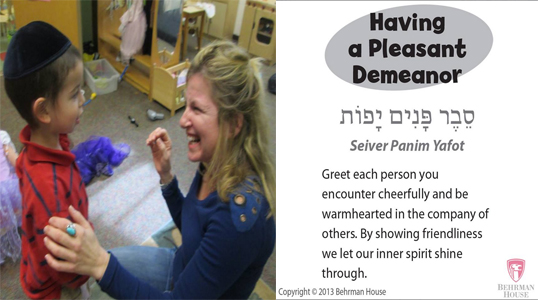 'Having a Pleasant Demeanor' Elul Family Values blog, by Haya Naftali.
'Having a Pleasant Demeanor' Elul Family Values blog, by Haya Naftali.
Teaching young children of "Being Friendly" is an essential social skill in early childhood development. What a difference it makes when you smile at someone, greeting them cheerfully rather that with a scowl or a frown.
 'Slow to Anger' Elul Family Values blog, by Sarah Meytin
'Slow to Anger' Elul Family Values blog, by Sarah Meytin
Young children are impulsive and full of physicality and emotion. As they grow, they are learning to control their behavior and respond to strong emotions in socially appropriate ways. When we boil over with anger, our children see modeled a message we would never want to send: that when emotions are running very strong, it's ok to hurt someone else (emotionally, if not physically.)
Can you share an example of how you model being slow to anger as a leader in your school? What strategies do you utilize for yourself and for the children and families in your school?
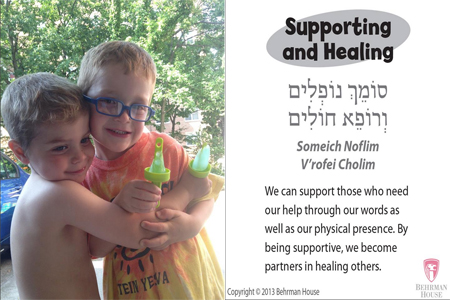 'Supporting and Healing' Elul Family Values blog, by Alana Stranger Weinberg
'Supporting and Healing' Elul Family Values blog, by Alana Stranger Weinberg
Have you hugged someone today? A recent study by the University of California at Berkeley found that hugs can increase oxytocin (the "bonding hormone"), which modulates fear and anxiety. Offering a hug or a gentle touch will help in overall health and healing and might even keep the doctor away better than the old apple!
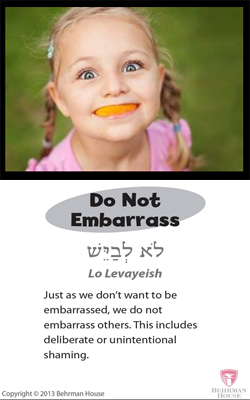
'Do Not Embarrass' Elul Family Values blog, by Steven Shimshak
The Talmud has strong words rearding embarrassing another person in public. "He who publicly shames his neighbor is as though he shed blood." Children come into the early childhood classroom with a vast range of personlities, temperments, and preferences. It is our role as teachers to provide a secure learning environment where children can embrace their differences and not be ashamed or embarrassed of the budding young people they are becoming.
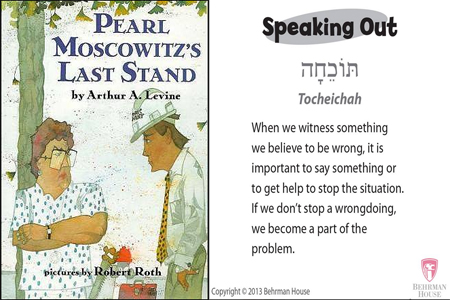
'Speaking Out' Elul Family Values blog, by Maxine Segal
The Lorax speaks for the trees. So does Pearl Moscowitz. To the king who fears freesing the birds his predicessors have kept caged for generations, Rabbi Zusya offers this rebuke, "Then your birds will be like theirs. Silent." Tocheichah-- a gentle rebuke, speaking out against wrongdoing--can bring song to a kingdom, and can, in fact, change the world.
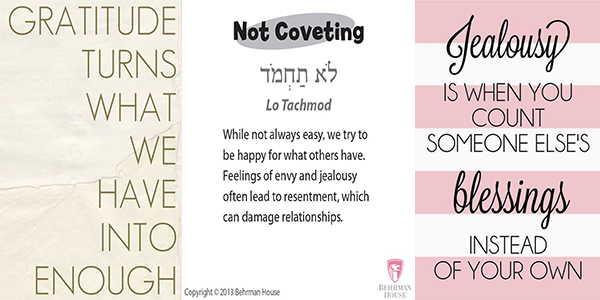
'Not Coveting' Elul Family Values blog, by Lisa Monette
Have you ever heard the phrase, "If you've forgotten the language of gratitude, you'll never be on speaking tearms with happiness"? According to studies at UC Davis, educators and parents alike need to model the "gratitude muscle" in order for our children to find value in this blessing.
 'Peace' Elul Family Values blog, by Cathy M Rolland
'Peace' Elul Family Values blog, by Cathy M Rolland
Peace can mean different things to different people. Though hard to articulate for a young child, she/he quickly learns to recognize and long for that precious feeling of safety, love and conflict-free calm.
Judaism has many beautiful prayers that ask for peace to be given to us, made for us, even spread as a shelter over us. We begin teaching even our youngest children to work for peace as a goal, not a given. They learn to share, to take turns, to listen when somebody else speaks. In that way we become God's partners in bringing peace to the world.
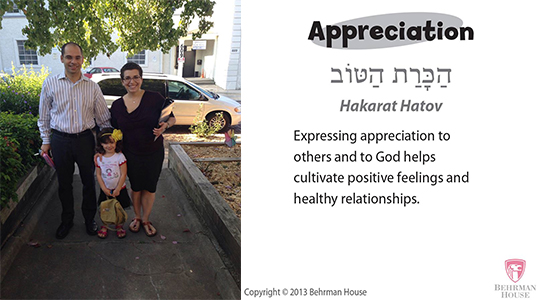 'Appreciation' Elul Family Values blog, by Dena Schusterman
'Appreciation' Elul Family Values blog, by Dena Schusterman
The Ba'al Shemtov tells us a Parable about the month of Elul. God, the king, awaits us in the field, symbolzing his accessibilty, and wishes for us to come forward to request of Him so that He can bestow His kindness upon us.
Just as a king needs subjects to bestow all his goodness and kingship upon, so too a teacher and a school needs students to educate and teach. We are grateful to our parents for sending us their children to be our students so that we can indeed fulfill our life's mission.
 'Social Action' Elul Family Values blog, by Emily Aronoff Teck
'Social Action' Elul Family Values blog, by Emily Aronoff Teck
Ask open ended questions like "What can we do to help?" and you might find that children already understand social action. Young children love to be helpers; supporting their attempts and creating opportunities for children to meaningfully contribute to our mission to repair the world can lay a life long foundation of the habit.
 'Prayer' Elul Family Values blog, by Alvan Kaunfer
'Prayer' Elul Family Values blog, by Alvan Kaunfer
Prayer arouses in us a sense of appreciation and wonder at the grandeur of the world and our lives. Try designating and decorating a window in your house to look out and see the everyday wonders with your child. Use a berakhah/blessing or create a prayer to express what you saw.
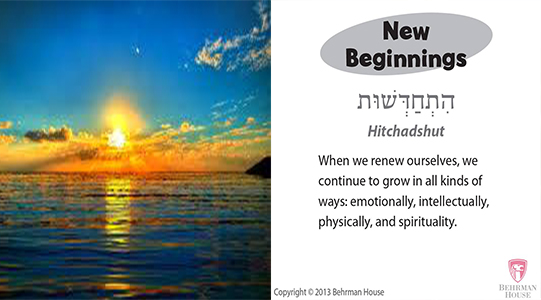 'New Beginnings' Elul Family Values blog, by Sarah Wilensky
'New Beginnings' Elul Family Values blog, by Sarah Wilensky
Children find comfort through rituals, which Judaism certaintly has plent of. During this season of 'new-ness' (new year, new class, new friends, etc.), find ways to ground each new day and welcome the opportunities that are sure to present themselves. Consider incorporating a Modeh Ani moment into the beginning of your moring and celebrate each shehekianuh event.
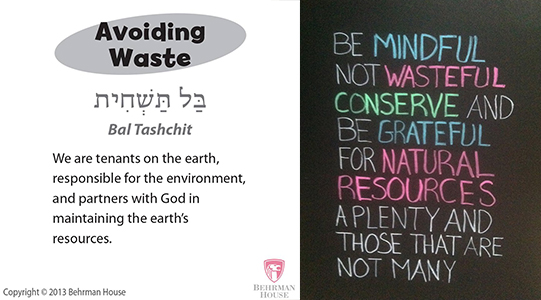
'Avoiding Waste' Elul Family Values blog, by Shariee Calderone
Protecting planet earth sounds like a REALLY big resposibility to a small child (heck it sounds like a big resposibility to me too!). Instead, invite children to...be mindfull not wasteful, conserve and be grateful, for natural resources aplenty and those that are not many!
 'Love of the Land of Israel' Elul Family Values blog, by Jennie Rubin
'Love of the Land of Israel' Elul Family Values blog, by Jennie Rubin
Creating a love of Israel is a gift that is precious and far reaching. Bringing this to children who are far from the physical place requires creative, heartfelt experiences.
Taste the fruit, smell the sea, hear the music and the stories, and connect children visually to the people and the landscape through pictures and video. By giving them concrete, amazing memories of the pretend, we connect their hearts and souls to the real place.
 'Respect for Animals' Elul Family Values blog, by Linda Oxman
'Respect for Animals' Elul Family Values blog, by Linda Oxman
Children are naturally curious and very gentle to creatures when they understand those creatures will treat them kindly in return. Offering children experiences in which they are responsible for the animals in their environment teaches them compassion and respect. Look for these opportunities in taking care of classroom pets and in the outdoor classroom, as the children investigate the bugs, butterflies, birds, bees, ants, lizards and spiders who live there.
 'Finding Beauty' Elul Family Values blog, by Emily Walsh
'Finding Beauty' Elul Family Values blog, by Emily Walsh
My favorite book for Rosh Hashanah is Peninna Scram's "The Apple Tree's Discover," where a little apple tree so desperately wants stars on her branches like she sees abover her. She prays and hopes and dreams for stars, until one day an apple drops from her branch and breaks in half revealing seeds in the shape of a star. Just like the apple tree, we can help children reveal the stars and beauty they have inside them.
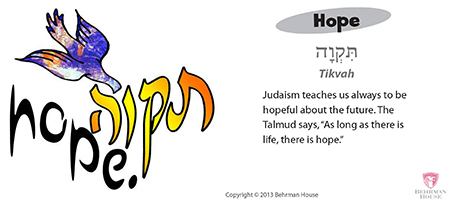 'Hope' Elul Family Values blog, by Mark Horowitz
'Hope' Elul Family Values blog, by Mark Horowitz
Hatikvah, the hope, is the national anthem for the people of Israel and Jews around the world. As we sing the words Tikvateinu & Hatikvah, the music modulates from a minor (sad-sounding) to a major (hopeful, energetic) key.
As Israel seeks lasting and peaceful solutions, how do we share our hopefulness as we pray for that elusive dream of Shalom, God's greatest gift of lasting wholeness and peace for Israel, for the world, for ourselves and our loved ones?
You can follow the values blog this month on Facebook by liking Behrman House and The Paradigm Project.
Want to explore Jewish values with your students? You can get free shipping when you order 3 or more decks of Jewish Values Challenge Cards. Just enter the code JVCfreeship (Not valid on orders of cards combined with other materials.)

